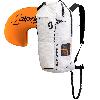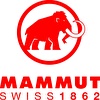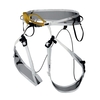Cerro Torre: Patagonian Democracy
On 14/02/2007 circa 40 mountaineers held an assembly at El Chaltén in Argentina’s "Los Glaciares" National Park to debate about the future if the expansion bolts on the 1970 Maestri “Compressor route” up Cerro Torre. Report and thoughts by Vicente Labate

 1 / 3
1 / 3
Tarmac, the true enemy
 arch. Vicente Labate
arch. Vicente Labate
On 14 February 2007, Valentine’s Day for most, circa 40 international mountaineers held an extraordinary meeting at El Chalten’s "Los Glaciares" visitor center to discuss the possibility of removing the expansion bolts along Cesare Maestri’s 1970 “Compressor route” up the SE Ridge of Cerro Torre.
As many, if not all, know, the discussion was about the bolts placed with the help of a compressor hauled onto the upper section of the wall by Maestri, Ezio Alimonta, Daniele Angeli, Claudio Baldessarri and Carlo Claus
Since the outset the “Compressor route” (not to be confused with the 1959 Egger-Maestri route) has provided plenty of controversy for the adopted style of ascent: a series of expansion bolts and a compressor on the wall.
At the end of assembly circa 30 of the 40 mountainerrs voted to leave the bolts in loco. But perhaps the actual outcome of the 2007 is the least important aspect, as the 34 year old Argentine Mountain Guide Vicente Labate who lives and works at El Chalten explains in his résumé if the “Mountaineering democracy” at the foot of Cerro Torre.
Patagonian Democracy: On Lovers' Day (Mountain Lovers').
by Vicente Labate
translation by Flavia Hayes
On 14th February this year, after a slide show by the Pou brothers, an assembly was held at Los Glaciares National Park Visitors' Centre, Lago Viedma Section, better known as El Chaltén, attended by climbers from several corners of the world: Venezuela, Brazil, Germany, Switzerland, The United States, Spain, Mexico, Chile and Argentina, together with both the president and secretary of the local Andean Club and the local Chief Ranger. The main objective of the meeting was to discuss the possible removal of expansion bolts placed by Cesare Maestri on Cerro Torre's south-western arête during his expedition in 1970, known as "The Compressor Route", the most criticized but also most frequently climbed route on the mountain. (I recommend reading the rather extensive story)
The idea of the meeting had been suggested by Ranger Carlos Duprez after an Argentinean climber had reported a party by the American team made up by Josh Wharton and Zach Martin, who had arrived at the park with the intention to climb the above mentioned arête without resorting to the bolts and if they accomplished their attempt they would descend by The Compressor Route with the idea of "cleaning" it by means of a device that they called "especial for the job"
At the end of the slide show people started to leave as it seemed that many didn't know what was going to happen. I approached Duprez and enquired about the meeting. I had hoped one of them would take up the role of moderator, but Carlos replied he was not going to do anything, they had only suggested the meeting and offered the premises for it to be held, and as they didn't understand much about the core of the affair they would comply with any decisions taken in the assembly. Despite the fact that it's practically impossible for a ranger to reach the "head wall" (hope to God they never will, for the sake of our independence!) we must bear in mind that the mountain stands within a national park created to protect the local biodiversity and the natural and CULTURAL Argentinean heritage.
Arguments in favour and against the removal of the bolts were put forward followed by voting for or against the expressed arguments keeping in sight the most relevant issues: the international climbing community as the main participants in the controversy, the National Park, the local community, Cerro Torre as a tourist goal and the mountain itself (with all the subjective mysticism of those aspiring to step on its summit, as long as "stepping" does not mean denigrating)
The National Park rangers abstained from voting, the local population had no idea of what a bolt was and therefore were not represented, and as us, the "Mohameds", go to the mountain, She was not present either. Only climbers had a vote.
If we take the assembly participants as the sample of a particular universe, they can be considered representative, since the meeting took place in the high season when the flow of international climbers is at its peak, and as the weather wasn't the ideal the whole climbing world spectrum was present.
During the meeting we attempted at the exposition of ideas without passing judgment, accepting and tolerating differing views, all aiming at a democratic agreement by means of a general vote. Everybody's say was precious, as it had been when signatures had been gathered for the Fitz Roy north pillar wouldn't be purchased by an economic group or when National Parks had been persuaded not to charge a climbing fee.?
It's worth mentioning the participation of some renowned climbers, such as Alex Huber or Iker Pou, making it clear that being well-known does not make their vote more significant, just famous. It's not necessary to be an elite
climber to understand the impact the bolts have had on the mountain and the climbing.
I should also mention that some Argentinean and Latin American climbers, beyond interpersonal relations, did not agree with granting foreigners the right to vote, mainly to those climbers from Europe, North America, Germany among others. However, as the history of Patagonian alpinism is written by everybody (by means of routes, attempts, with shelters, assemblies, etc) we did not repeat Maestri's mistake and allowed everybody's vote to lead us to an
answer.
Give Torre Its Wild Side Again
The mountain is not wild any more (needless to say we are not referring here to its whimsical weather changes), it stopped being wild the day the first occidental human gave it a name, a value, and particularly when the town of El Chaltén was founded in 1985. The mountain has not stopped being wild because of the number of bolts it has, but because there's a town which fully caters for all needs just a few walking hours away, with two supermarkets, satellite internet connection and a fully paved road straight to " The Patagonian Vegas", El Calafate (airport and casino included).
Not only the surrounded facilities and services have deprived it of its wildness, but what kind of doubt may there remain as to the easy accessibility these peaks have since a relatively accurate weather forecast can be obtained by phone or the Web at any moment?
Common Sense
Different interests coexist in this world, more often than not these interests are contradictory, and within that diversity we can find cultures, languages, food, buildings, etc. To accept this diversity is to accept ourselves / to accept our human nature.
Therefore, the search for Common Sense becomes imperative, especially in order not to tread on anybody else's rights. We are fully aware that our globalized society is still far from reaching this goal, but, why can't we, climbers, at least give it a try, since we make up a very reduced universe?
Ideas were put forward in an openly. The talk was carried out in Spanish but translators were available whenever necessary. We were all granted time and respect for our views to be expressed clearly and at ease. When every soul had their say, hands were raised to vote.
The Result
Hands were counted on the spot. Nobody said a word after the second group voted. From about 40 people, approximately 30 voted for the bolts to remain on the mountain.
Conclusion
Despite the fact we expressed our views, the issue is not over, lets be ready for growth an evolution.
In my opinion, this summer gave us the opportunity to say:
- No to bolt ladders on any mountain as from now.
- Yes to the search for common solutions.
- No to any kind of dominance, in ideas or actions.
- Yes to accepting history as part of our culture.
As many, if not all, know, the discussion was about the bolts placed with the help of a compressor hauled onto the upper section of the wall by Maestri, Ezio Alimonta, Daniele Angeli, Claudio Baldessarri and Carlo Claus
Since the outset the “Compressor route” (not to be confused with the 1959 Egger-Maestri route) has provided plenty of controversy for the adopted style of ascent: a series of expansion bolts and a compressor on the wall.
At the end of assembly circa 30 of the 40 mountainerrs voted to leave the bolts in loco. But perhaps the actual outcome of the 2007 is the least important aspect, as the 34 year old Argentine Mountain Guide Vicente Labate who lives and works at El Chalten explains in his résumé if the “Mountaineering democracy” at the foot of Cerro Torre.
Patagonian Democracy: On Lovers' Day (Mountain Lovers').
by Vicente Labate
translation by Flavia Hayes
On 14th February this year, after a slide show by the Pou brothers, an assembly was held at Los Glaciares National Park Visitors' Centre, Lago Viedma Section, better known as El Chaltén, attended by climbers from several corners of the world: Venezuela, Brazil, Germany, Switzerland, The United States, Spain, Mexico, Chile and Argentina, together with both the president and secretary of the local Andean Club and the local Chief Ranger. The main objective of the meeting was to discuss the possible removal of expansion bolts placed by Cesare Maestri on Cerro Torre's south-western arête during his expedition in 1970, known as "The Compressor Route", the most criticized but also most frequently climbed route on the mountain. (I recommend reading the rather extensive story)
The idea of the meeting had been suggested by Ranger Carlos Duprez after an Argentinean climber had reported a party by the American team made up by Josh Wharton and Zach Martin, who had arrived at the park with the intention to climb the above mentioned arête without resorting to the bolts and if they accomplished their attempt they would descend by The Compressor Route with the idea of "cleaning" it by means of a device that they called "especial for the job"
At the end of the slide show people started to leave as it seemed that many didn't know what was going to happen. I approached Duprez and enquired about the meeting. I had hoped one of them would take up the role of moderator, but Carlos replied he was not going to do anything, they had only suggested the meeting and offered the premises for it to be held, and as they didn't understand much about the core of the affair they would comply with any decisions taken in the assembly. Despite the fact that it's practically impossible for a ranger to reach the "head wall" (hope to God they never will, for the sake of our independence!) we must bear in mind that the mountain stands within a national park created to protect the local biodiversity and the natural and CULTURAL Argentinean heritage.
Arguments in favour and against the removal of the bolts were put forward followed by voting for or against the expressed arguments keeping in sight the most relevant issues: the international climbing community as the main participants in the controversy, the National Park, the local community, Cerro Torre as a tourist goal and the mountain itself (with all the subjective mysticism of those aspiring to step on its summit, as long as "stepping" does not mean denigrating)
The National Park rangers abstained from voting, the local population had no idea of what a bolt was and therefore were not represented, and as us, the "Mohameds", go to the mountain, She was not present either. Only climbers had a vote.
If we take the assembly participants as the sample of a particular universe, they can be considered representative, since the meeting took place in the high season when the flow of international climbers is at its peak, and as the weather wasn't the ideal the whole climbing world spectrum was present.
During the meeting we attempted at the exposition of ideas without passing judgment, accepting and tolerating differing views, all aiming at a democratic agreement by means of a general vote. Everybody's say was precious, as it had been when signatures had been gathered for the Fitz Roy north pillar wouldn't be purchased by an economic group or when National Parks had been persuaded not to charge a climbing fee.?
It's worth mentioning the participation of some renowned climbers, such as Alex Huber or Iker Pou, making it clear that being well-known does not make their vote more significant, just famous. It's not necessary to be an elite
climber to understand the impact the bolts have had on the mountain and the climbing.
I should also mention that some Argentinean and Latin American climbers, beyond interpersonal relations, did not agree with granting foreigners the right to vote, mainly to those climbers from Europe, North America, Germany among others. However, as the history of Patagonian alpinism is written by everybody (by means of routes, attempts, with shelters, assemblies, etc) we did not repeat Maestri's mistake and allowed everybody's vote to lead us to an
answer.
Give Torre Its Wild Side Again
The mountain is not wild any more (needless to say we are not referring here to its whimsical weather changes), it stopped being wild the day the first occidental human gave it a name, a value, and particularly when the town of El Chaltén was founded in 1985. The mountain has not stopped being wild because of the number of bolts it has, but because there's a town which fully caters for all needs just a few walking hours away, with two supermarkets, satellite internet connection and a fully paved road straight to " The Patagonian Vegas", El Calafate (airport and casino included).
Not only the surrounded facilities and services have deprived it of its wildness, but what kind of doubt may there remain as to the easy accessibility these peaks have since a relatively accurate weather forecast can be obtained by phone or the Web at any moment?
Common Sense
Different interests coexist in this world, more often than not these interests are contradictory, and within that diversity we can find cultures, languages, food, buildings, etc. To accept this diversity is to accept ourselves / to accept our human nature.
Therefore, the search for Common Sense becomes imperative, especially in order not to tread on anybody else's rights. We are fully aware that our globalized society is still far from reaching this goal, but, why can't we, climbers, at least give it a try, since we make up a very reduced universe?
Ideas were put forward in an openly. The talk was carried out in Spanish but translators were available whenever necessary. We were all granted time and respect for our views to be expressed clearly and at ease. When every soul had their say, hands were raised to vote.
The Result
Hands were counted on the spot. Nobody said a word after the second group voted. From about 40 people, approximately 30 voted for the bolts to remain on the mountain.
Conclusion
Despite the fact we expressed our views, the issue is not over, lets be ready for growth an evolution.
In my opinion, this summer gave us the opportunity to say:
- No to bolt ladders on any mountain as from now.
- Yes to the search for common solutions.
- No to any kind of dominance, in ideas or actions.
- Yes to accepting history as part of our culture.
Note:
* Vicente Labate, 34 Argentinian Mountain Guide since 1994 he studied geography at the University of Lujan. Based in El Chalten, he has been working as a patagonian guide for the last 10 year. Adventure travellers, he is constantly searching for new challenges (on foot, by bike, canoe, kayak, yacht, horse riding). He speaks Argentinian, English and Italian. He has climbed in Europe, Argentina, Bolivia, Perù, Brasil and Chile.
* Vicente Labate, 34 Argentinian Mountain Guide since 1994 he studied geography at the University of Lujan. Based in El Chalten, he has been working as a patagonian guide for the last 10 year. Adventure travellers, he is constantly searching for new challenges (on foot, by bike, canoe, kayak, yacht, horse riding). He speaks Argentinian, English and Italian. He has climbed in Europe, Argentina, Bolivia, Perù, Brasil and Chile.
| Planetmountain | |
| News Cerro Torre | |
Latest news
Expo / News
Expo / Products
25 Liter backpack with avalanche bag
Ever since its market launch, the Barryvox avalanche transceiver has been among the most reliable transceivers in the world.
Lightweight skitouring and mountaineering harness by Singing Rock.
Petzl Irvis Hybrid crampons for ski touring and approaches involving glacier travel.
Ocun Diamond S climbing shoes designed for maximum performance, comfort, and precision
The Zenith is a mountaineering axe that uniquely combines lightweight design with technical features for top-level performance.



 Copia link
Copia link























